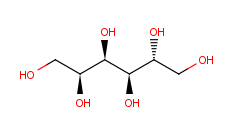Sorbitol
-
- Category :
Pharmaceuticals and Biochemicals
- CAS NO : 50-70-4
- EC NO : 200-061-5
- Molecular Formula : C6H14O6
- Main Specifications : BP98/USP24
- Synonyms : Clucitol;D-Glucitol;D-Sorbit;D-Sorbitol;Glucitol;Gulitol;L-gulitol;Sorbite;
Package: Powder: 25kg/bag; 18MT/FCL
Uses : the materials of Vc in medicine and materials of surfactant in light industry. It also can be used in toothpaste, cigarette and cosmetics as the substitute of glycerin
Molecular Structure:

Product description:
Product: sorbitol
Molecular Mormula: C6H14O6
Molecular Weight: 182.173
Properties: White crystalline powder.
Applications:
Sorbitol is widely used in fields of medicine,light industry,food and chemistry.It is mainly used for the materials of Vc in medicine and materials of surfactant in light industry. It also can be used in toothpaste, cigarette and cosmetics as the substitute of glycerin. In the food industry, sorbitol is used as edulcorator, especially suitable for the food of diabetics;it also can lengthen the storage term of some food.In chemical industry,sorbitol rosin ester is used as the materials of common construction coating.
ORAL HYGIENE FORMULATIONS
Due to plastifying and humectants properties, SORBITOL is widely used in tooth pastes
and other oral hygiene formulations. It has resistance to fermentation by dental
plaque bacteria
COSMETICS
It preferred in cosmetics, because in addition to it's moisture stabilizing property.
It's slippery and has emulsifying properties. It is non-toxic and leaves an
agreeable coolness on the skin. It is useful component of beauty creams , make
up cosmetics shaving creams, lotions, soaps etc.
FOOD INDUSTRY
SORBITOL is widely utilized for diabetic foods and for keeping confectionary and
bakery products fresh and to preserve the colour and also improves the keeping quality
of canned fruits. It does not undergo milliards reaction. It is incorporated
as per users requirements into various food items like toffees, biscuits, jams,
jellies, chocolates, candies, fruit drinks, carbonated drinks, canned fruits
etc.
PHARMACEUTICAL INDUSTRY
SORBITOL is used as an ingredient in a number of pharmaceutical preparations like
syrups, olixirs, sulpha drugs, tonics, vitamins and amino acids-complex preparations,
laxatives and ointment based for hepatic and diabetic diseases, SORBITOL
injections are used.
TOBACCO INDUSTRY
Tobacco processed with SORBITOL gives mild aromatic fames when smoked and does not
develop acrolein, which may be the case when glycerine is used as humectants.
SORBITOL being non volatile, the tobacco aroma is preserved.
TEXTILE INDUSTRY
SORBITOL is used as softening agent to ensure better processing of fibres. Used in
textile printing pastes and textile finishes. When SORBITOL is used it gives sharp
outline, better colour yields and lustre.
PAPER INDUSTRY
SORBITOL increases the flexibility of paper, thus folding #118alue is higher while the
length of rupture and elongation does not change abnormally.
PAINT INDUSTRY
It can be used as cost effective replacement of propylene glycol in liquid paint.
Specifications:
Sorbitol Powder
1) Appearance: white crystalline granule or powder
2) Assay: 99.0% min.
3) D-sorbitol: 98.0% min.
4) Reducing sugars: 0.1% max.
5) Total sugars: 0.3% max.
6) Ph (50% aq. soll.): 5.0-7.0
7) Solubility at 25°C: 235gp100ml water
8) Granule size (at your option): 10-20 or 20-60 mesh
9) Residue on ignition: 0.1% max.
10) Heavy metals: 5ppm max.
11) Nickel: 1ppm max.
12) Lead: 1ppm max.
13) Arsenic: 1ppm max.
14) Chloride: 50ppm max.
15) Sulphate: 50ppm max.
16) Total bacterium: 100pg max.
17) Colon bacillus: absent in 1g
18) The product meets the requirements of: USP24, BP98, FCC IV
Sorbitol liquid
Appearance: colorless syrup liquid.
Certification: Kosher
Dry substance: 70% min.
Water 30% max.
Refractive index (20°C): 1.4575 min.
Specific gravity (20°C): 1.290g/ml min.
PH in 50% DS aqua. sol: 5.0~7.5 max.
Resistivity: 20/cm max.
Reducing sugar: 0.15% max.
Total sugar: 6.0%-10.0%
Iron: 1.0mg/kg max.
Nickel: 1.0mg/kg max.
Heavy metals (as Pb): 1.0mg/kg max.
Arsenic (as As2O3): 1.0mg/kg max.
Chloride: 1.0mg/kg max.
Sulphated ash: 0.10% max.
Total count: 50/ml max.
Non-crystallization: no crystal at -18°C in 24h
